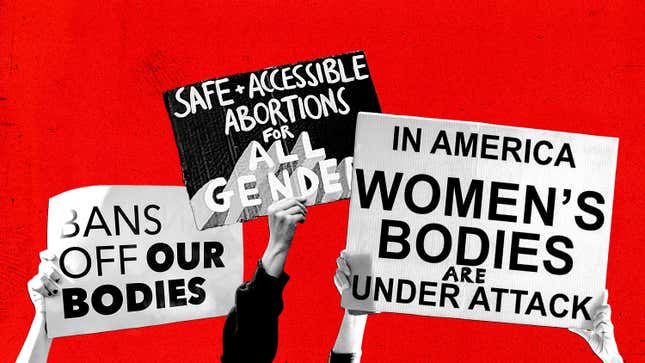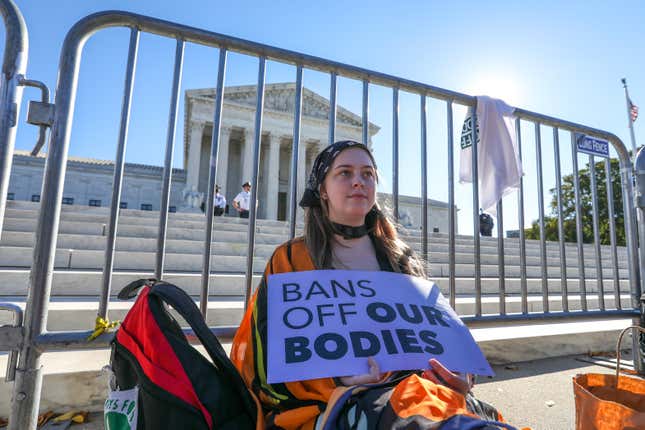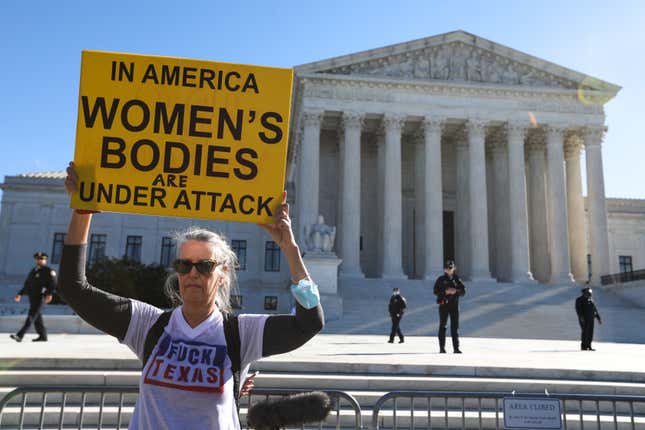Abortion Bans Are Disregarding the Lives of Sexual Assault Survivors
By removing even exceptions for rape from their anti-abortion legislation, Republican politicians are finally starting to say the quiet part out loud.
In DepthIn Depth
Image: Angelica Alzona (Photos: Getty)
Anti-abortion politicians have always been clear on one thing: Abortion is murder. But for years, this “logic” hasn’t held up against their occasional concession that abortion bans make exceptions for rape. Of course, if these politicians genuinely believed that abortion is murder, they wouldn’t allow any concession at all. Instead, they have long used the rape exception to have it both ways, claiming to simultaneously care about women and also be “pro-life”—two antithetical positions to take.
This dynamic is beginning to shift. Since the much-publicized feud between Rep. Marjorie Taylor Greene and fellow Republican Rep. Nancy Mace last December over whether abortion bans should include rape exceptions at all, a string of recent proposed and enacted state abortion bans have been made in Taylor Greene’s image more so than Mace’s. Just earlier this month, Florida’s state legislature voted to reject adding an exception for rape to its 15-week abortion ban; lawmakers in Arizona and West Virginia similarly declined to add exceptions for rape to their own 15-week bans. SB8 in Texas bans abortion without exceptions for rape, and nearly a dozen other state legislatures are racing to replicate it as we speak.
In 2022, these state legislatures are pushing this agenda with the strong support of mainstream Republican lawmakers—the same ones who used to try to play it both ways but are now seemingly eager to demand that survivors, should they become pregnant, be forced to carry and birth their rapists’ babies. Abortion bans always made this horrifying outcome possible, even with an exception for rape on paper. Only now, politicians are saying the quiet part out loud.
Fewer and fewer abortion restrictions with rape exceptions, and shrinking Republican support for these exceptions, signal a daunting reality: The anti-abortion movement has finally seized enough political power to enact abortion bans almost indiscriminately, without even the pretense of compromise. This will carry more harm for survivors of rape.
Survivors’ trauma was “reduced to currency” by rape exceptions
Rape exceptions put Republicans in a political bind. Abortion bans without any exemptions for rape and incest survivors are deeply unpopular with the public, and yet, true believers who insist that “abortion is murder” cannot admit that there are situations in which abortion is morally acceptable.
Until recently, anyone who branched off from the contradictory narrative that they could care about women and survivors while opposing abortion at the same time was disavowed: Ten years ago, then-Missouri Senate candidate Todd Akin essentially tanked his campaign by asserting that we don’t need rape exceptions to abortion bans because “legitimate rape” can’t lead to pregnancy. Then-Indiana candidate Richard Mourdock sank his bid for Senate in a similar way that same year, saying that when a woman becomes pregnant from rape, “God intended” that.

In 2017, Alison Turkos survived being kidnapped and gang-raped on a Lyft ride in New York. The harrowing experience changed the course of her life. For nearly a decade before the assault by her Lyft driver, Turkos had been working in the reproductive justice movement, advocating for pregnant people’s bodily autonomy. Her lived experiences with sexual violence and years of abortion advocacy showed her that “survivors and someone who’s seeking abortion care want the same thing—we want control over our bodies, at any time, for any reason.” In the years since, she’s become a leader in organizing at the intersections of survivor justice and reproductive justice.
Turkos believes anti-abortion lawmakers are increasingly abandoning their performance of support for victims and “showing their true colors,” because “they’ve been able to get so far.” In her eyes, lawmakers have passed hundreds of bans and restrictions in the last decade by “using survivors as a shield while trying to fast-track these bills through the legislature.” In other words, by including rape exceptions and therefore permitting abortions for the “right reasons,” legislators could shut down criticisms of their bills as being cruel or anti-women.
-

-

-

-

-

-

-

-

-

-

-

-

-

-

-

-

-

-

-

-

-

-

-

-

-

-

-

-

-

-

-

-

-

-

-

-

-

-

-

-









































